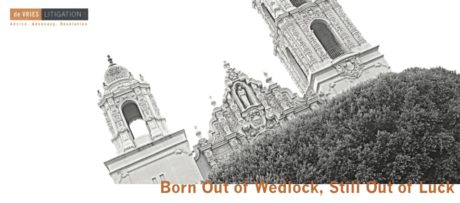Should someone be excluded from inheriting from an estate simply because they were born out wedlock? With “a good deal of regret”, Justice Gray of the Superior Court of Justice concluded in Koziarski v. Sullivan that the answer was “yes”… with respect to wills made before March 31, 1978.
Jadwiga Koziarski died on February 15, 2016 at the ripe old age of 94. She had two sons: Stefan and George. George, who predeceased Jadwiga, had two children: Jesse and Nicole. George was not married to Jesse’s mother. Several years after Jesse’s birth, George married another woman and had a daughter, Nicole, with her.
Jadwiga’s will was dated December 14, 1977. She divided her estate equally among her children, or to the surviving issue of any predeceased child. The court had to determine whether Jesse was George’s “issue” such that he would receive half of George’s interest or whether Nicole would receive the entirety of George’s share.
Prior to 1978 in Ontario, there was a presumption that neutral words such as “child” “grandchild” or “issue” did not apply to people born out of wedlock. This presumption was rebuttable (e.g. if the testator used the word “child” at a time when they only had a child born out of wedlock). This presumption was changed by the legislature through the enactment of the Succession Law Reform Act (the “SLRA”). Subsection 1(3) of the SLRA states that unless there was a contrary intention in the will, people born out of wedlock are to be treated the same in wills as those born within it. However, subsection 1(4) of the SLRA clarified that this applied to wills made on after March 31, 1978.
The legislators turned their mind to the consequences of subsection 1(4) of the SLRA. The then Attorney General Roy McMurtry stated that the bill removed the consequences of illegitimacy in inheritance matters. However, the Attorney General also stated that people may have drawn their wills relying on the existing law. On balance, he believed that it would be fair to restrict the application of this section to wills made after the SLRA came into force. Liberal MPP Albert Roy objected to this amendment (interestingly enough, both Roy McMurtry and Albert Roy are now retired judges). Mr. Roy stated: “Yet under this we may be 50 years down the way where we’re still saying that certain illegitimate children will be denied because the wills were made before July 1, 1977.”
His prediction came to pass. Justice Gray found that to hold that Jesse had an entitlement under the will would effectively read subsection 1(4) out of the SLRA. This would counteract the statutory interpretation presumption against tautology: legislatures should be presumed to avoid superfluous provisions. Justice Gray held that if he was free to apply his own notion of public policy, he would construe the will as Jesse suggested. But his Honour was not willing to ride the “unruly horse” of public policy, holding that it was not open to him to repeal sections of the SLRA by judicial fiat.
As the difficulty at issue arose from the testator’s choice of words, Justice Gray ordered that both parties receive their substantial indemnity costs out of the estate.
This case is a stark rejoinder to those who believe judges simply ‘make up the law’. Justice Gray interpreted the statute in a manner anathema to his personal beliefs.

